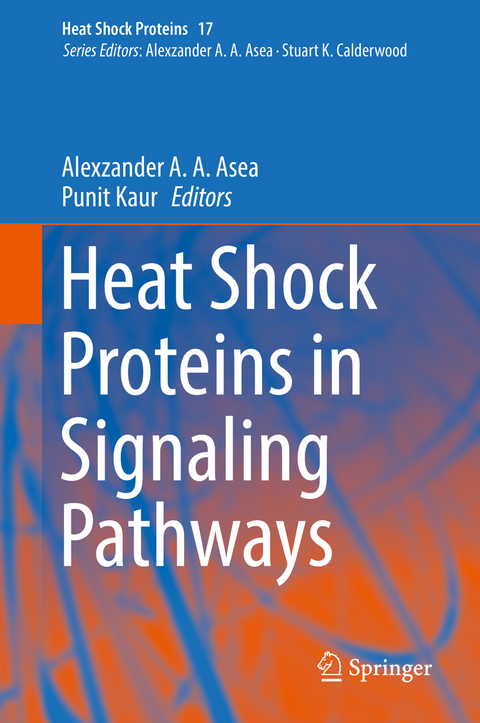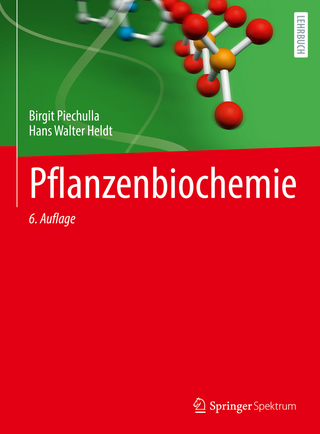
Heat Shock Proteins in Signaling Pathways
Springer International Publishing (Verlag)
978-3-030-03951-6 (ISBN)
Signaling pathways is a comprehensive mechanism by which all cellular organisms communicate internally and externally with their microenvironment. This is a highly complex and exact process. Errors in signaling pathways and in the processing of cellular information are known to be responsible for the majority of diseases including cancer, inflammatory and neurological disorders. Knowledge gained from the better understanding of signaling pathways will help in elucidating disease processes and will assist in development and design of novel targeted treatment therapies to combat human diseases and disorders. Heat shock proteins (HSP) are uniquely involved in a number of critical signaling pathways.
Key basic and clinical research laboratories from major universities, academic medical hospitals, biotechnology and pharmaceutical laboratories around the world have contributed chapters that review present research activity and importantly project the field into the future. The book is a must read for graduate students. medical students, basic science researchers and postdoctoral scholars in the fields of Translational Medicine, Clinical Research, Human Physiology, Biotechnology, Cell & Molecular Medicine, Pharmaceutical Scientists and Researchers involved in Drug Discovery.
Thiol-based Redox Signaling: Impacts on Molecular Chaperones and Cellular Proteostasis.- Heat Shock Proteins (HSP) in Stress-Related Inflammatory Diseases.- Heat Shock Response and Metabolism in Skeletal Muscle.- Temperature Stress and Redox Homeostasis: The Synergistic Network of Redox and Chaperone System in Response to Stress in Plants.- Dynamics of Heat Shock Proteins in Immunity and Aging.- Heat Shock Proteins, Exercise and Inflammation.- Heat Shock Proteins and Alarmins in Autoimmunity.- HO-1/Hsp32 and Cardiac Stress Signaling.- Targeting Heat Shock Proteins in Multiple Myeloma.- IER5 is a p53-Reguated Activator of HSF1 that Contributes to Promotion of Cancer.- Heat Shock Proteins in Digestive Tract Cancer: Molecular Mechanism and Therapeutic Potential.- The Role of Heat Shock Protein 90 in Regulating Downstream Signal Transduction Cascades.- Extracellular Hsp90a versus Intracellular Hsp90b in Wound Healing and Cancer.- Regulation of Calcineurin Signaling through Blocking of the Chaperone Function of Hsp90 by HDAC Inhibitors.- Signaling Functions of Extracellular Hsp90 (eHsp90) in Cancer Metastasis.- The Role of the Molecular Chaperones Hsp70 and Hsp90 in the DNA Damage Response.- Heat Shock Protein 90 Inhibitors in Lung Cancer Therapy.- Hsp90 Inhibitors Blocking Multiple Oncogenic Signaling Pathways for the Treatment of Cancer.- Diverse Roles of Heat Shock Proteins in Immune Activation and Tolerance: A Comprehensive Review of Mechanisms and Therapeutic Relevance.- The Role of Heat Shock Proteins on Neuromuscular Disorders/Neuronal Differentiation.- Heat Shock Proteins in Neural Signaling: Implications in Health and Disease.- Cytosolic Heat Shock Protein 90 in Plant Hormone and Environmental Stress Response.
| Erscheinungsdatum | 20.07.2019 |
|---|---|
| Reihe/Serie | Heat Shock Proteins |
| Zusatzinfo | XI, 482 p. 63 illus., 41 illus. in color. |
| Verlagsort | Cham |
| Sprache | englisch |
| Maße | 155 x 235 mm |
| Gewicht | 949 g |
| Themenwelt | Naturwissenschaften ► Biologie ► Biochemie |
| Naturwissenschaften ► Biologie ► Mikrobiologie / Immunologie | |
| Schlagworte | Cancer • cell death • HSP expression • Inflammatory Diseases • Neurological disorders • Targeted treatment therapies |
| ISBN-10 | 3-030-03951-X / 303003951X |
| ISBN-13 | 978-3-030-03951-6 / 9783030039516 |
| Zustand | Neuware |
| Haben Sie eine Frage zum Produkt? |
aus dem Bereich


